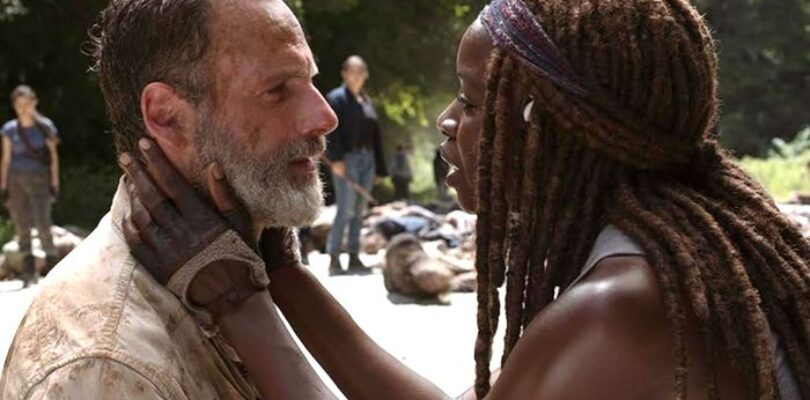Photo: AMC
This spring, fans of The Walking Dead get to see the franchise’s favorite power couple come back to the spotlight with The Walking Dead: The Ones Who Live. Originally titled The Walking Dead: Rick & Michonne, it centers on the titular characters and what happened after Rick was infamously picked up by a mysterious helicopter and Michonne went off on a quest to find him. It’s not the first spinoff to revolve around a popular character from the main series (it’s actually the third!), but by reintroducing Rick and Michonne to the fold, The Ones Who Live is bound to get some attention from those who watched their love blossom amid the ceaseless carnage.
And it’s been quite a journey getting here. The Walking Dead premiered almost 14 years ago, and through its 11 seasons, Rick and Michonne went from total strangers to lovers, becoming the emotional backbone of the whole series. So to refresh your memory of how the two came together, here are 12 must-watch episodes that chart their relationship from its beginnings to the point where they became the “ones who live.”
To understand Rick Grimes (Andrew Lincoln), his eventual relationship with Michonne (Danai Gurira), and the trajectory of the series in full, one only needs to watch the pilot episode: He’s a man searching for something. In this case, it’s his family, but it could be a wider community, a moral code, weapons and supplies, a better future — anything. It’s the trait that keeps him from ever devolving into a prototypical action-hero type; he’s far too racked with constant anxiety to ever just be the stock leading man. In that way, Michonne will come to complement him. She becomes his compass, allowing him to continue his eternal search without getting lost.
It will take a while for Rick to recognize he needs that, though. Luckily, when we meet Michonne, she’s in roughly the same emotional boat. Although she wields a katana, leads around two “walkers” on leashes, and initially speaks in little more than terse whispers, she’s far from a stoic, socially inept badass. She has too much empathy for that; when faced with a sick Andrea (Laurie Holden), a controversial character during her three-season run in The Walking Dead’s early years, it takes surprisingly little convincing for Michonne to run around finding medicine and help for her. In the right environment, her sword skills and tireless ability to support the weak and desperate could be of great use. Rick is a man who’s always searching. Michonne is a woman who needed to be found.
Two episodes after Rick’s wife, Lori (Sarah Wayne Callies), dies while giving birth to their daughter, Rick is still doing pretty poorly. He’s aimless and spends most of his time having hallucinatory chats with the deceased people he feels he has failed. He needs to come to terms with his own grief before he can even hold his newborn child. When he finally emerges from his melancholic cocoon, he finds himself ready to perform as a father and a leader again. But this rebirth also coincides with his first sighting of Michonne, standing outside the prison walls and covered in blood. In retrospect, it’s a neat visual metaphor. (The prison fences represent Rick’s willingness to let people in! The gore represents the fact that Rick’s partnerships will always be stained in the blood of the rough choices he has to make! The sword is … a cool sword!)
Rick’s nervousness means that he and Michonne have to take time to properly connect. As such, Rick’s son becomes the first member of the Grimes family to find the good in her. Carl (Chandler Riggs) is a young boy who yearns for stable mentorship, something he gets less of when his dad’s mental state seems on the verge of crumbling. Although he initially distrusts Michonne, when they team up to go find things for baby Judith, Carl starts to warm up to her, especially when it’s clear that she understands the emotional importance of family. And by the end of the episode, both father and son end up a little more attached: Michonne reveals to Rick that she too has talked to dead people to comfort herself. In The Walking Dead, that’s a match made in heaven.
The Walking Dead’s fourth season takes place a few months after the end of the third, meaning Rick and Michonne have been able to spend some more offscreen time getting to know each other. This results in some mild flirtation and the first sprinkling of a will-they, won’t-they that had previously only been the territory of Daryl (Norman Reedus) and Carol (Melissa McBride.) To this day, though, the latter pair remain in the won’t-they category, so Rick and Michonne become a fan base’s last hope for romance. Michonne even finds Rick a razor and comments on the state of his facial hair, which means she’s been paying attention to Lincoln’s chiseled jawline. We get it, Michonne. It’s hard not to.
The midseason finale of season four completely unravels the cast. The Governor (David Morrissey) returns, ruins the group’s prison settlement with a tank, then beats Rick within an inch of his life. This leaves Rick as a battered shell, and Carl and Michonne both have a hand in nursing him back to health. It’s our first taste of the trio on a true domestic level as they live in an abandoned house, eat cereal together, chitchat, and help one another get over the astounding losses they’ve recently experienced. (At this point, Rick and Carl assumed Judith had died in the Governor’s assault.) Carl even learns about Michonne’s late son, a child she lost in the early days of the dystopia. By the time they all set out on the road together, they’ve become a warm family unit.
One thing that links Rick and Michonne is that even though they’re often forced into leadership positions, both are outdoor cats. They bristle when told what to do, often stray away when they feel emotionally encumbered, and have a tough time fitting in when they don’t feel useful. Having entered the community of Alexandria, Rick’s team of misfits immediately clashes with the closest thing that the show has given us to ineffectual suburbanites. And Rick and Michonne, recognized for their ability to get things done and lay down the law, become the settlement’s constables despite the fact that they’re oddly resentful of just how vulnerable the residents seem. It’s fitting, though — no two people seem more equipped to drag the cast of The Walking Dead, kicking and screaming and biting, into a better tomorrow.
Most pieces of zombie media inevitably shift from an emphasis on horror to a focus on action. Everything from Resident Evil to George A. Romero’s own Night of the Living Dead sequels swing around in this manner, and The Walking Dead is no different. The Walking Dead would enact copious “Look at how many zombies we’re gonna have to take down!” scenes in this new era, the best of which happened midway through season six. Not only does Carl lose an eye in the chaos, but Rick, Michonne, and the crew’s dedication to fighting back against a horde inspires the rest of Alexandria to join in. They’ve gone from would-be power couple to, essentially, the parents of the new world. They might not be perfect, but their desire to adapt is the best example possible in a place where often the cruelest force wins.
And look at that: The following episode is, for the most part, centered on how good things can be when people work together … and get together. Sure, a ton of the episode is devoted to the dynamic duo of Rick and Daryl palling around in postapocalyptic buddy-cop fashion, but at the end, when Rick and Michonne come home to discuss their days, the long-awaited union finally happens. Laughing turns to kissing, which turns to a fade-in on them lying naked in bed together. It isn’t The Walking Dead’s most long-awaited hookup (shippers of Daryl ’n’ Carol are still holding out hope despite the fact that their simple friendship is rather beautiful on its own), but it gives two characters a chance at happiness after spending years in what was sometimes the most cynical show on television.
If it isn’t clear by now, Rick is prone to bouts of despair. On the one hand, it’s a good thing, as it keeps him from getting stale. On the other, it means that someone else has to pull Rick out of his mental muck. In this case, it’s Michonne who, after the villainous Negan (Jeffrey Dean Morgan) and his group have (quite literally, with a baseball bat) decimated Rick’s hopes, must pull her lover back from the brink. Season seven was a big turning point in the show — after fan favorite Glenn’s death pulverized any sense of optimism, there was really nowhere to go but up. Michonne rallies Rick’s spirits, eventually echoing one of his own quotes back to him with “We’re the ones who live.” In doing so, she not only reignites Rick’s will to fight back but sets the tone for the rest of the series.
Depending on how you look at it, “What Comes After” is either a clumsy piece of franchising or a devastating gut punch. Rick sacrifices himself to save his group from yet another tremendous herd of walkers, something that sends Michonne into agony. (For someone who entered the show as a mysterious warrior, there are few characters better at mournful explosions of emotion.) Of course, Rick isn’t dead, and after a round of hallucinations that give some cameos to long-deceased cast members, he’s inexplicably carried away by a helicopter to places unknown. We now know that place: his own spinoff!
The finale of The Walking Dead had a lot to accomplish: It had to set up the plotlines for three different future shows (one for Negan and Maggie, one for Daryl, and one for Rick and Michonne) while also providing a satisfying conclusion for the series. Since Gurira hadn’t been a main cast member since the previous season, her section of the finale is the most abridged. But in the short time we have with her (and the people telling us about her), we learn that she’s continuing her hunt for Rick, not believing that even a giant explosion above a raging river among a mass of zombies would be enough to take her man down.
And to be fair, she’s right — and believes in herself enough that she’s willing to leave their kids, Judith and the young RJ, behind to find him. Yes, it means that the final episode of The Walking Dead is little more than a setup, and yes, it ends with Judith painstakingly affirming that they are “the ones who live.” But at one point earlier in the show, Rick announced to his group, in a moment of reconciled doom, that they all “are the walking dead.” And if love can change a popular TV show’s famous catchphrase, then what can’t it accomplish?





